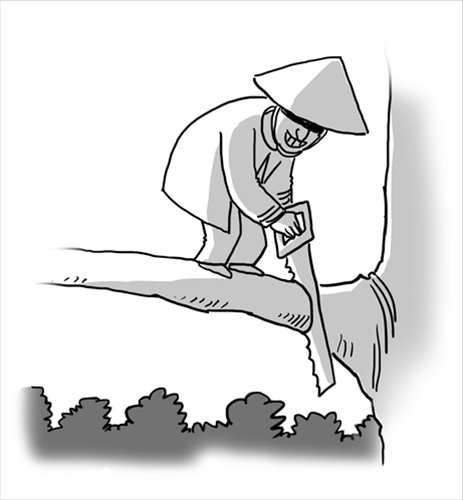Vietnam trapping itself through stirring up popular nationalism

Illustration: Liu Rui/GT
Over the past week, many cities in southern Vietnam embarked on anti-China demonstrations. The protests finally evolved into violent clashes. These anti-China rallies originated from the territorial dispute between China and Vietnam over the South China Sea. The factories that have been most severely damaged are not run by mainland businessmen but by Taiwanese. Meanwhile, factories run by Singaporeans, South Koreans, Malaysians and even some Europeans have also been targets.
Such mayhem may generate devastating results to the Vietnamese economy that is still recovering after the 2008 financial crisis. The violent attacks have made foreign investors lose the sense of security. Their best choice would be to stay away from the country. This means Vietnam will lose a great deal of taxes and job opportunities.
From a long-term perspective, the awful memories will not be completely removed from the minds of overseas investors. No one can tell when similar incidents will reoccur in Vietnam. To avoid potential risks, foreign companies will prefer smaller, shorter-term projects. These kinds of investment will contribute little to Vietnam's economic development.
For the Vietnamese, the biggest trouble currently is that their country's order is likely to spiral out of control. The Vietnamese government has always played such tricks: When the economy is in a terrible situation and the public is discontent, the authorities stir up nationalistic sentiments by inflaming the South China Sea issue so that the public can forget what most damages their interests.
Unfortunately, the Vietnamese government obviously overestimated its control over the situation in the country. The hasty political reforms and the public resentment caused by disparity between the rich and the poor and soaring commodity prices have weakened the authority of the Vietnamese government.
It is no coincidence that the recent violence has taken place in southern Vietnam where the opposition have a solid foundation. The demonstrations have run out of control since being initiated, becoming a tool through which the opposition boost their influence.
For example, the US-based exile group Viet Tan, or the Vietnam Reform Party, which got thousands of "likes" on Facebook, has posted many photos of anti-China rallies. This group has been named by the government of Vietnam as a terrorist organization and a number of members were arrested for being anti-China.
The examples of Egypt and Ukraine show us that for countries within which many conflicts have been accumulated, no matter what the initial reasons are behind the demonstrations, these reasons will soon be forgotten by the public. What people care about is not any particular event that triggers their protests. They simply want to vent the dissatisfaction that has been stored up so long.
To put it simply, the anti-China rallies will not shift the public's concern as the Vietnamese authorities have expected.
Rather, they give people an opportunity to vent their anger recklessly. As the opposition are involved, these rallies may turn into a street political movement aimed at the Vietnamese government.
The government must realize that the attempt to trigger international disputes so as to shift domestic conflicts will only end up in vain. In the previous violence, Vietnamese police have arrested about 100 people. This will not fundamentally solve the problem but may further escalate tension between the authorities and the public.
The so-called "appeal to the public to legitimately express their patriotism" is merely a wishful self-deception. What happened in Vietnam has showed that the authorities cannot put everything under control. It will be an arduous task for them to restore the image of their country.
They need to make clear that the Chinese are not to blame for their misfortune. Besides, if you are unhappy about the sanitary conditions in your house, dismantling it will not solve the problem but will only make your circumstances worse.
The author is a political commentator based in Baotou, Inner Mongolia Autonomous Region. opinion@globaltimes.com.cn